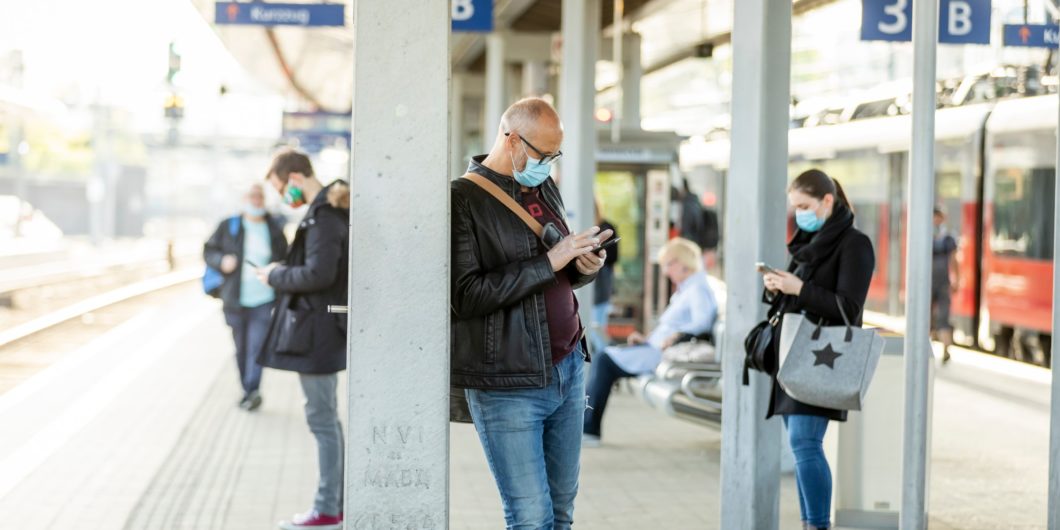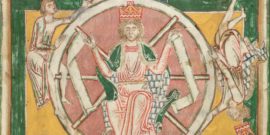Every generation is born into a world it didn’t make, into a mess of which it was not the author.
Plagues, Ancient and Modern
“Well, I guess we’re about to find out whether Hobbes was right about the state of nature!”
So joked one of my students in mid-March, as we said our goodbyes for what would turn out to be the rest of the semester. It was a good way to lighten the mood. Knowing that the coronavirus was coming, and with only a hazy impression of its nature and effects, it was easy to jump to dire predictions of social collapse. The joke was also true to Hobbes, who exhorts the readers of Leviathan to verify his arguments by observing their own habits. But if conditions became sufficiently extreme, we would all be forced to see what is normally hidden—the truth about human nature unobscured by political order. Hobbes described this state as one in which there is “continual fear and danger of violent death, and the life of man, solitary, poor, nasty, brutish, and short.”
Rightly observed, a crisis, like a scientific experiment, can reveal a hidden truth. When my student joked about our opportunity to evaluate Hobbes’s observations, my mind went to Thucydides, whose narrative of the disorders and dangers of primitive Greece inspired Hobbes’s state of nature, and who himself survived the plague of Athens.
The Athenian Plague
Thucydides described his work not as “history” but as a kind of physics, or more precisely, kinetics. The Peloponnesian War, he said, was “the greatest motion (kinēsis) that has happened among the Greeks.” This is not just a peculiarity in phrasing. His work is an inquiry into motion and the cause of motion. Thucydides reveals how the evident movement of men and matériel during wartime may be traced back to the speeches of statesmen and demagogues, each of which is, in turn, a kind of “motion” issuing from the primary motions of human life, the passions of the soul: fear, desire, honor, self-interest, ambition, and so on.
To expand the metaphor, Thucydides writes not only as a physicist but also, at times, as a chemist. Moments of crisis, such as the Corcyraean Revolution, dissolve our ordinary comforts and thereby reveal our nature.
In peace and prosperity cities as well as private men are better minded because they are not plunged into necessity of doing anything against their will. But war, taking away the affluence of daily necessaries, is a most violent master and conforms most men’s passions to the present occasion.
The Plague of Athens, which breaks out in the second year of the war, is another such revelatory moment of crisis, in which great misfortune reveals truths about human nature generally as well as the state of a particular society. Thucydides is not a determinist; he is careful to note that a crisis brings most men to a level with their circumstances. As Clifford Orwin noted in a recent article in the Globe and Mail, the plague exposed the character of the Athenians who suffered through it, some of whom—very few, but some—met the occasion with heroic virtue. Despite the profound differences between the plague of Athens and the coronavirus, as well as the technological, social, and political differences between 5th-century Athens and the 21st-century world, the incurability of each disease exposes the souls of men through their actions in the face of great fear. Orwin’s reading of Thucydides unveils both the endurance of human nature, as well as the changes introduced by modernity to how our nature finds expression in virtue and heroism.
Recounting the instances of “lawless extravagance” occasioned by the plague, Thucydides writes:
Men now did just what they pleased, coolly venturing on what they had formerly done only in a corner, seeing the rapid transitions produced by persons in prosperity suddenly dying and those who before had nothing succeeding to their property. So they resolved to spend quickly and enjoy themselves, regarding their lives and riches as alike things of a day. Perseverance in what men called honor was popular with none, it was so uncertain whether they would be spared to attain the object; but it was settled that present enjoyment, and all that contributed to it, was both honorable and useful. Fear of gods or law of man there was none to restrain them. As for the first, they judged it to be just the same whether they worshipped them or not, as they saw all alike perishing; and for the last, no one expected to live to be brought to trial for his offenses, but each felt that a far severer sentence had already been passed upon them all and hung ever over their heads, and before this fell it was only reasonable to enjoy life a little.
On a political scale, classicist Neville Morley has plausibly suggested that the plague accelerated Athenian antinomianism, which (along with the death of Pericles, himself a victim of the plague) enabled Athenian hubris in their conduct of the war. The breakdown of morality, piety, and social order brought on by the plague thus helps to explain the infamous Athenian sentiments expressed in the Melian Dialogue and the imperial ambition of Alcibiades that captivated Athenian policy and led to the disastrous invasion of Sicily. The plague thus revealed a characteristic of the Athenians that had been hidden by skilled political leadership and their military successes.
Our American Plague
The effects of the coronavirus are unlikely to be so spectacular as the plague, and not only because it is less destructive. Alexis de Tocqueville observed that the very aristocratic cultures that cultivated the loftiest souls also produced the greatest vices, whereas democratic societies, aiming lower at their best, sink not so low at their worst. The corruption of the best is the worst; the corruption of the mediocre, by contrast, is more banal than monstrous.
What, then, has the coronavirus revealed to us about ourselves? While others rightfully celebrate the noble instances of heroic service and ordinary kindness it has occasioned, let me dwell here with a few ugly truths.
The terror of a deadly virus for which we have no cure has reminded us that we are not gods.
Individually, we may not have noticed much “lawless extravagance,” shameless licentiousness, and disregard for the laws of gods and men—in no small part because the laws of God are already held cheap, because we are already accustomed to license, and because we are already enabled by technology and encouraged by society to indulge the vices that an ancient Athenian would ordinarily entertain only “in a corner.”
As the lockdowns began, internet pornography companies pounced to invite laid-off low-wage workers to “supplement their income” by joining the “online adult entertainment industry.” And the mainstream press was obliging, publishing thinly-veiled puff pieces for porn platforms about opportunities for the newly-unemployed to “monetize themselves”—savvy financial self-interest married to healthy and safe self-expression! All in a day’s work: companies built on sexual exploitation will thrive in times of real isolation coupled with virtual “connection.”
It would be difficult to conceive the mainstream promotion of “monetizing yourself” if we had not already become Extremely Online. Last year, nearly 30 percent of Americans reported being online “almost constantly.” The number for 18 to 29 year olds was 48 percent. While our online world has helped keep portions of the American economy running during this crisis, its excesses have serious downsides. In addition to the individual detriments of internet and screen addiction—obvious to common sense and confirmed by social science—there are political dangers as well.
One need not agree with the Michigan protestors that Governor Whitmer’s restrictions (including those which are simply nonsensical) constitute tyranny to recognize the disturbing way in which American society has been preparing itself for tyranny for a long time. Consider Aristotle’s description of how tyrants seek to keep their cities enslaved to their rule:
Tyranny aims at three things: one, that the ruled have only modest thoughts (for a small-souled person will not conspire against anyone); second, that they distrust one another (for a tyranny will not be overthrown before some persons are able to trust each other […]); and third, an incapacity for activity, for no one will undertake something on behalf of those who are incapable, so that not even a tyranny will be overthrown where the capacity is lacking. […] One may reduce all things characteristic of tyranny to these presuppositions—that [the ruled] not trust one another, that they not be capable, that they have modest thoughts.
Tyrants, in other words, seek to encourage mediocrity in their subjects, toxic discourse and mutual distrust, and destruction of the means—including the leisure afforded by moderate wealth, and community solidarity—for their rule to be challenged by the people. And these are precisely the results of contemporary education, screen addiction, and an atomized middle class. Public officials may exacerbate these trends by how they respond to the current crisis—encouraging neighbors to report on one another, for example. But few have recognized the regime-level dangers posed by the erosion of community and our technological order. The pre-existing conditions of our ailment have been with us for a long time.
The Roman poet Horace wrote, “You may expel nature with a pitchfork, but it will always return.” While he did not have in mind the “re-wilding” of quarantined urban spaces hyped earlier this spring, there are encouraging signs, here and there, that the coronavirus is forcing us to rethink the conditions of human flourishing in how we order our lives individually and in common. The realignment that began in 2016 continues, as ambitious young politicians scramble party orthodoxy to confront the economic fallout of the coronavirus. Despite the best efforts of our progressive elites, homeschooling is now a prominent alternative in the public mind. Screen saturation may well provoke a new appreciation for reality—the real community of people, and the real beauty of nature—an appreciation that has become increasingly difficult for those who were not already removed from our tech-obsessed society by circumstance or conscious choice. The mid-semester disruption has already begun to harm colleges and universities. Let us hope that it truly winnows the field—revealing competent and incompetent leadership, vital sinews and administrative bloat, the ordered or disordered priorities of each institution, and the best methods for each kind of education.
Social distancing may be ending in many parts of the country, but the unfortunate truth is that we were already socially distant, and we were already suffering for it. Social science has dutifully verified the wisdom of the tradition, that one “who has no need of a city because he is sufficient for himself, must be either a beast or a god.” The terror of a deadly virus for which we have no cure has reminded us that we are not gods; so, too, in a subtler way, has the isolation into which it has forced us. It is up to us to decide, now, to rise above the level of the bestial and recall the proper means and ends of human life, to be found in restored and re-embraced community.



